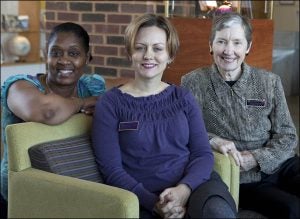BATTLING PRENATAL DEPRESSION
Researchers study effectiveness of program for expectant moms

Shown left to right, resource mom Tara King, project coordinator Elizabeth Feldhousen and Dr. Elizabeth Jesse in the ECU College of Nursing are working together to examine the effectiveness of Insight-Plus, a program designed to help women who are at risk for depression during pregnancy. (Photo by Cliff Hollis)
Now with a new baby boy at home, Daja Walters got help with feelings of worthlessness and sadness during her pregnancy by enrolling in an East Carolina University research study.
A College of Nursing research team is studying the effectiveness of a program called Insight-Plus in helping women at risk of depression in pregnancy.
Walters enrolled last September. The San Diego, Calif., native moved to North Carolina in July and was expecting her fourth child. She had not been depressed with previous pregnancies, or at least never recognized it, she said.
This time, she slept a lot, hoping things would be better when she woke up, and at times, she even questioned her faith. The program helped her cope with the day-to-day tasks of raising older children and working full-time, crying jags and a loss of interest in just about everything.
“It helped me get a more positive outlook on things,” said Walters, 31. “I still use the MP3 player they provided and listen to the mellow tones, the beach. It helps me relax. I do the self-assurance statements to help motivate me.”
Federally-funded study
The Insight-Plus program and study is funded by a $640,742 National Institute of Mental Health grant awarded to Dr. D. Elizabeth Jesse, ECU professor of graduate nursing science in the College of Nursing and associate professor of obstetrics and gynecology in the Brody School of Medicine.
Studies show up to 50 percent of pregnant women experience depressive symptoms, and about 13 percent develop antepartum or prenatal depression, which can mimic typical pregnancy symptoms from mood swings to fatigue or a change in sleep patterns. Up to 50 percent of women who suffer from antepartum depression also will have postpartum depression, so early intervention is important, Jesse said.
Thirty-five women have joined the study to reduce stress and feel better during pregnancy. Researchers want to enroll 124 by the end of this year. Women are being recruited at ECU Physicians Regional Perinatal Center and the Pitt County Health Department.
Walters enjoyed interacting with other expectant mothers who understood her feelings. “The group atmosphere, not just one-on-one, and not feeling like I was being judged, I could talk it out with a group of people,” she said.
Participants meet privately in groups at their clinic for two hours once a week for six weeks with Renee Pearson, group facilitator and licensed clinical social worker, and Tara King, resource mom with a master’s degree in social work. Gary Ambert is the interpreter. Child care and transportation are offered, and each woman receives a MP3 player loaded with positive affirmations and stress-reducing techniques.
Erasing the stigma
Women often are reluctant to talk about depression during pregnancy or ask for help because of the stigma surrounding it, and they don’t want to appear weak or risk being called a “bad mother,” said Jesse, a certified nurse midwife. “We take the stigma away,” she said.
The program gives women tools to work on obstacles they might face, from domestic violence to finances or housing. “We focus on empowerment, to be in tune with oneself, to develop effective communication skills to get more of what they want or need,” said King, who keeps in regular contact with participants during 10 weeks of the study. She also asks that they call when their baby is born so she can send a card or visit.
Researchers also have resources for women who may need help outside the realm of the study, for instance, those who may be suicidal or mentally ill, Jesse said.
Participants complete interviews about stress, sadness and depression three times during the study. For taking part, women receive gift cards, regular contact with trained staff, and information on prenatal and postpartum depression and services and resources in the community.
Elizabeth Feldhousen, a doctoral candidate and licensed marriage and family therapist, is the project coordinator. Research assistants are graduate students Mariza James, Farrah Forney, Lisa Buchner, Meagan Capers and Zachary Love.
Co-investigators at ECU are Dr. Melvin Swanson, professor of nursing; Dr. Shelia Bunch, professor and director of the School of Social Work; and Dr. Edward Newton, professor of obstetrics and gynecology and vice chair for clinical research in the Brody School of Medicine. Jesse also is collaborating with colleagues at the University of North Carolina at Chapel Hill, Vanderbilt University and the University of Virginia.
People interested in participating in the study may call 252-341-7216.